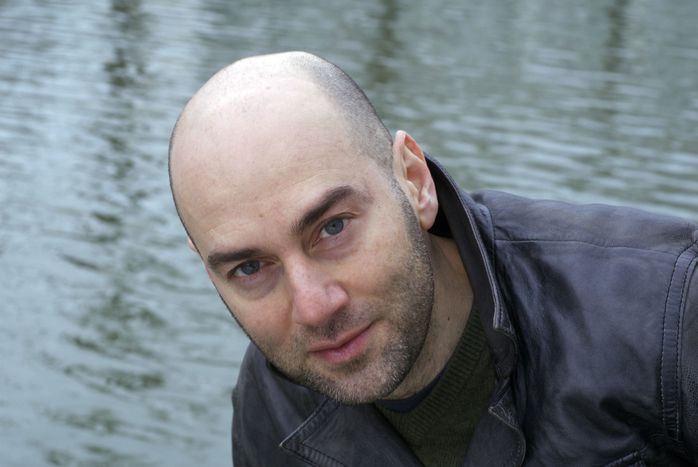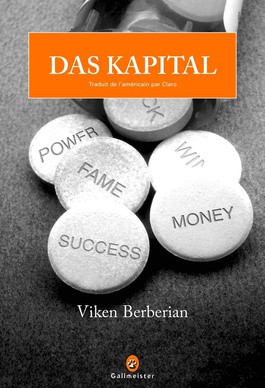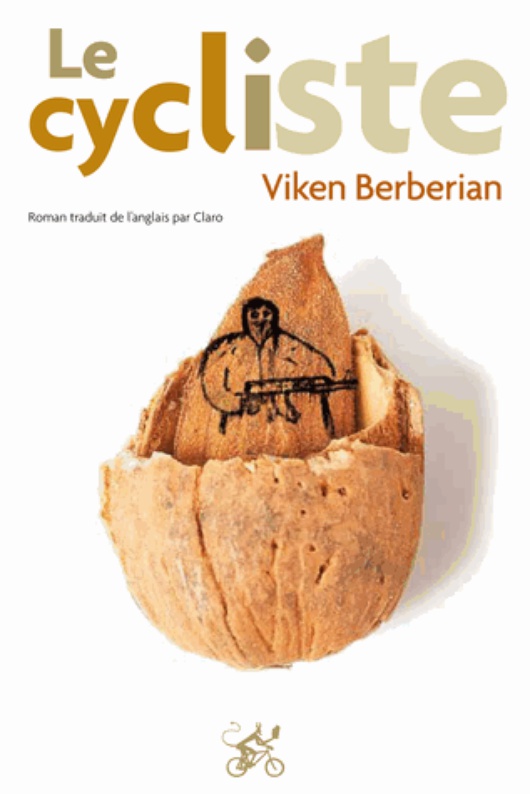
Viken Berberian: 'I tried to put myself in the head of a terrorist'
Published on
Translation by:
 Mr Zee
Mr Zee
The American writer's debut novel, 'The Cyclist', has at long last been published in France some eleven years after its publication in an America still reeling after the 9/11 attacks. It’s a fictional account of terrorism viewed through the lens of cycling, love and homemade food
'Hi. Is this cafebabel.com?' In shoots the smiling, short, shaven-headed man who we find standing on our doorstep in Paris, beret pressed against his chest. Viken Berberian looks like a kid who can’t wait to get that sweet he’s been promised. After some brief thoughts on the organised chaos of editorial HQ - 'So, here is where you are!' - he sits down, comes out with a load of questions, asks for a glass of water and then gets wound up about whether the interview will be conducted in English or French. He communicates all this in perfect French, with just a hint of an accent, making him instantly likeable. Today for once, the European magazine is being visited by a writer.
From journalism to finance
 Paris is not Viken’s first move by far. He was born in West Beirut, in the muslim part of the Lebanese capital, where Berberian later clarifies by email that there was a 'minority Armenian presence. The Armenian community in Lebanon is (was) mostly in East Beirut. Our family was an exception in that we lived on the muslim west side rather than the christian east.' His family fled to Los Angeles to avoid the civil war in December1975 when he was nine years old. There, the family integrated into the Armenian community. Ten years later the 19-year-old was to receive a phone call informing him that his father had been killed by a terrorist faction in Lebanon. A short time later he went to New York where, at Columbia university, he proved to be a brilliant student due to a clear-sightedness rarely found in journalists. Berberian freelanced for a while at the Los Angeles Times before going over to what he refers to as 'the dark side' – the world of finance. He worked at a hedge fund in New York before moving to Marseille. In the south of France, he wrote his second novel Das Kapital: A Novel of Love and Money Markets. It was published in the USA in 2007, before the sub-prime crisis, and came to the French book market in 2009. With his story of a trader trying to profit from market declines, we can see just why Viken Berberian is regarded as a visionary enfant terriblein the French media.
Paris is not Viken’s first move by far. He was born in West Beirut, in the muslim part of the Lebanese capital, where Berberian later clarifies by email that there was a 'minority Armenian presence. The Armenian community in Lebanon is (was) mostly in East Beirut. Our family was an exception in that we lived on the muslim west side rather than the christian east.' His family fled to Los Angeles to avoid the civil war in December1975 when he was nine years old. There, the family integrated into the Armenian community. Ten years later the 19-year-old was to receive a phone call informing him that his father had been killed by a terrorist faction in Lebanon. A short time later he went to New York where, at Columbia university, he proved to be a brilliant student due to a clear-sightedness rarely found in journalists. Berberian freelanced for a while at the Los Angeles Times before going over to what he refers to as 'the dark side' – the world of finance. He worked at a hedge fund in New York before moving to Marseille. In the south of France, he wrote his second novel Das Kapital: A Novel of Love and Money Markets. It was published in the USA in 2007, before the sub-prime crisis, and came to the French book market in 2009. With his story of a trader trying to profit from market declines, we can see just why Viken Berberian is regarded as a visionary enfant terriblein the French media.
Berberian then moved to Paris where he worked in the research segment of a financial consultancy from 2006 to 2010. Today, he is 46, lives in Yerevan and is doing research on medieval priests in the Matenadaran, one of the largest repositories of ancient manuscripts and documents in the world. He smiles when I refer to his 'old demons from the dark side'. 'Deep down I know that I am fundamentally a writer but I know I want to do other things as well,' he begins. 'I’m not the quintessential artist. If you want to be one you need to take more risks than I have.' Still, Viken Berberian took some risks by coming (back) to France. His first novel The Cyclist, published a decade earlier in the USA, is written in the first person and contains the thoughts and reflections of a man in a terrorist cell. The cell wants to plant a bomb using a bicycle. 'I started writing the story in 1997, a long time before the 9/11 attacks. There was some criticism when it came out in print (a few months after 9/11 - ed). A journalist admonished me that I couldn't 'relativise political violence at this point in time'.'
 In hindsight, Berberian could now boast that he was one of the few writers to give a 'literary response' to 9/11. But Viken Berberian doesn’t want this message to be lost in the history of coincidence and luck. 'Writers should go beyond the here and now,' he says. 'A book should not be constrained by current events. I’m not an apologist for terror. In The Cyclist, the protagonist patently rejects political violence against civilians.'
In hindsight, Berberian could now boast that he was one of the few writers to give a 'literary response' to 9/11. But Viken Berberian doesn’t want this message to be lost in the history of coincidence and luck. 'Writers should go beyond the here and now,' he says. 'A book should not be constrained by current events. I’m not an apologist for terror. In The Cyclist, the protagonist patently rejects political violence against civilians.'
Terrorists fall in love too
Even though this first novel paints a 285-page portrait of a terrorist planning a bombing in Lebanon, political issues are watered down in Viken Berberian’s writing amid endless culinary and sexual digressions. 'I have a playful writing style, and that enables me to give politics a back seat,' he explains. It is plain to see that his main character is guided by the Academy, which is the name of the terrorist cell. The author portrays him as a foodie ('I just can’t say no to food', the character says at one point) and lascivious. 'I tried to make him more human. When journalists talk about terrorism, they just focus on the violence. But terrorists eat and fall in love too. So I tried to put myself in the head of a terrorist to get a better understanding of what makes him tick.' This is well illustrated in another passage from the book, which is directed at the free world: 'Despite our tough exterior, harder than a walnut's, underneath, we’re just as human as you.'
'When journalists talk about terrorism, they just focus on the violence. But terrorists eat and fall in love too'
Anyway, this work is not a set of reflections on modern terrorism. It’s more of a meditation on the absurdity of life and the simple pleasures, like making love, eating or cycling. The Cyclist is a metaphor for violence and life which also has a connection with the author’s own personal experience. 'I love cycling. I had a friend and we were going to bike from Paris out to the region of Provence. Two weeks before we were due to start he had a serious accident and fell into a coma. He was not wearing a helmet,' says a still shaken Viken. His book starts with these lines: 'You should always wear a helmet when riding a bicycle. The helmet should fit snugly. The chin strap should hold firmly against the throat. The buckle should be fastened securely.' Terrorists can be a role model for road safety too.
All images: courtesy of the French publisher of 'Le Cycliste', © Éditions Au Diable Vauvert, and Das Kapital courtesy of © amazon
Translated from Viken Berberian, Le Cycliste : écriture à la bombe


